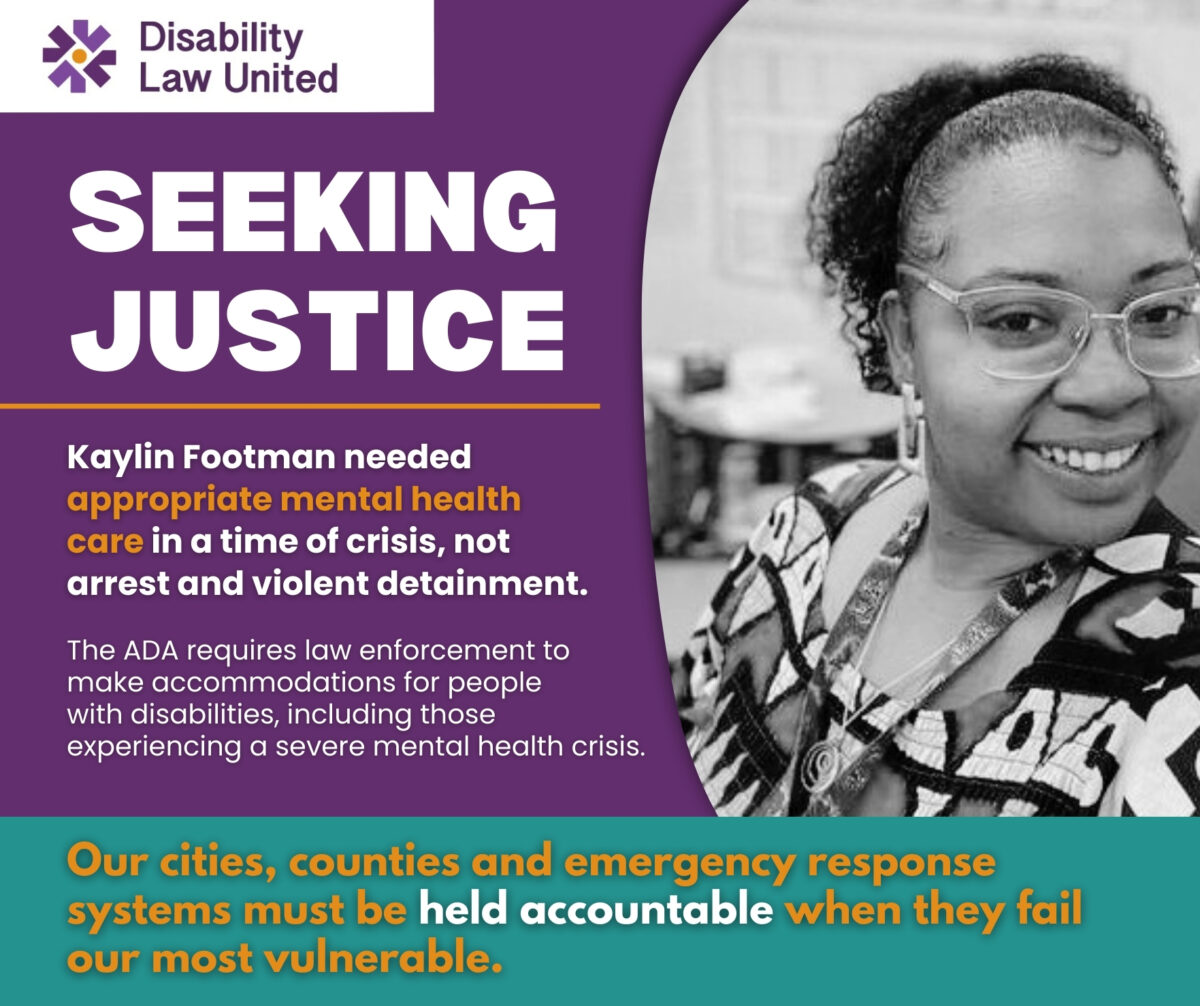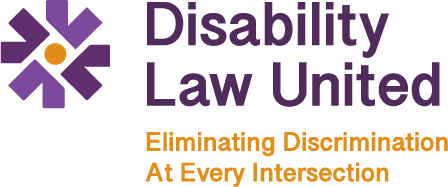For media inquiries or questions, please contact Cynthia Rice, DLU Legal Director, at (303) 551-9389 or crice@dlunited.org.
When Kaylin Footman’s family sought help for her during a mental health crisis, they didn’t expect police officers to arrest her instead – nor did they know she’d spend a horrifying ten days in jail without mental health care or support.

Disability Law United has filed a lawsuit on behalf of Ms. Footman, a disabled Black elementary school teacher who was forcefully arrested and brutally treated by law enforcement and emergency medical personnel, despite assurances to her family that she’d be taken to a mental health facility for evaluation and treatment.
The complaint alleges that Sacramento County Sheriff’s Office deputies, Sacramento Police Department officers, and Sacramento County paramedics neglected their duty of care to Ms. Footman, whom they treated inhumanely, failing to appropriately evaluate or assess her condition and then defying a judge’s order to move Ms. Footman to a mental health facility. Instead, they held her in general population, where she was further traumatized and neglected, only worsening her condition.
A Nightmare Unfolding
During her time in jail, Ms. Footman was subjected to so-called “pain compliance techniques,” and spent days in excruciating pain, naked, and with a deteriorating mental state, without receiving appropriate medical care. She experienced a severe manic episode and panic attacks, was unable to sleep, eat or drink, and repeatedly cried out for help – but none came.
After five long days spent in general population, a judge ordered a transfer to an outside mental health facility, but instead, Ms. Footman was placed on a psychiatric hold within the jail. Sacramento County Sheriff’s deputies ignored her pleas for her glasses, pulled violently on her arms and legs, shoved her to the ground and tasered her before transferring her out of general population and into the jail’s psychiatric unit. Five more days went by before she was finally transferred to an actual mental health facility.
Ultimately, Ms. Footman was incarcerated for ten days with no visitation, no accommodations, and no treatment for her mental condition. What should have been an immediate evaluation for a mental health crisis instead became a prolonged nightmare.
Seeking Justice & Accountability
DLU staff attorney Aviance Brown said of the complaint,
“Police and prisons are not the appropriate responses to individuals experiencing mental health crisis. It is long past time that we develop robust mental health infrastructure that proactively addresses this issue and responds with community oriented, health-based initiatives.”
We know Sacramento County is one of the worst in California when it comes to rates of suicide, and residents lack adequate mental and behavioral health services. With thousands of Sacramento County residents suffering from mental health conditions – and nearly 20% of the adult population having been diagnosed with depression – a lack of available services and resulting strain on the existing mental health infrastructure means local jails essentially operate as asylums for those with mental disabilities. Law enforcement officials are the leading responders to calls for help involving mental health crises, yet they are not trained nor equipped with the tools necessary to respond effectively.
Kaylin Footman needed appropriate mental health care in a time of crisis, not arrest and violent detainment – and her experience is far from unique.
SCSO deputies have responded to mental-health related calls with deadly force dozens of times in the last decade alone, and since 2019, the number of mental health calls to SCSO has nearly doubled. For Kaylin Footman and countless others, a mental health crisis has been worsened by neglect, a lack of appropriate training, and strained care systems. The Americans with Disabilities Act requires law enforcement to make accommodations for people with disabilities, including those experiencing a severe mental health crisis. Our cities, counties and emergency response systems must be held accountable when they fail our most vulnerable, among them our community members with disabilities.
Disability Law United (formerly known as Civil Rights Education and Enforcement Center) is a nonprofit legal organization fighting for liberation through intersectional disability justice with a combination of education, legal advocacy, direct services, and impact litigation. Our work is informed by grassroots movements for systemic change and centers the concerns and goals of people with disabilities who are confronting barriers to access to programs and services and resisting oppressive legal systems in the United States.
